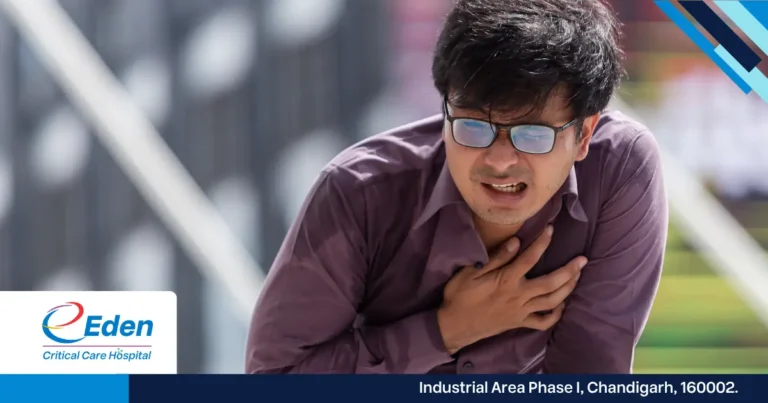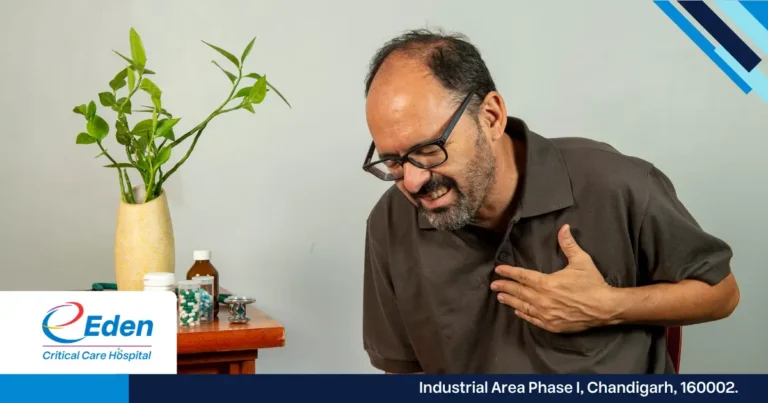Heart Blockage: 7 Early Signs Most People Miss!

You felt a strange pressure in your chest last week but brushed it off as acidity. After all, it vanished in minutes. You were busy, and it didn’t feel serious.
That’s exactly how heart blockages quietly build up until one day, your heart screams for help… and you’re already running out of time.
Most people confuse early signs of heart blockage with gas, muscle pain, or plain fatigue. But what they don’t realize? That “random” discomfort could be your heart sending its first and only warning signal.
In this article, I’ll walk you through the 7 early signs of heart blockage that people ignore way too often, the real difference between harmless and dangerous pain, and when it’s time to rush to the hospital. Let’s break the silence before it breaks your heart.
What Is Heart Blockage?
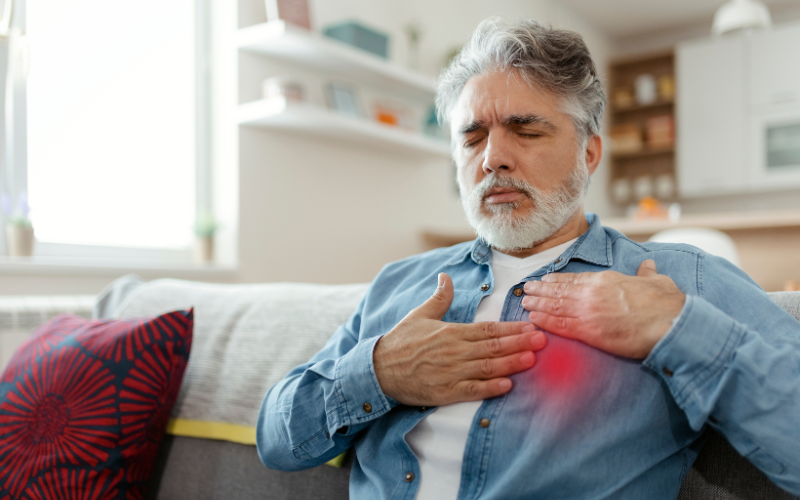
Imagine your heart as the engine of your body. It pumps life through miles of blood vessels nonstop. But when those vessels, especially the coronary arteries, start narrowing or get blocked, your engine starts sputtering.
A heart blockage happens when fatty deposits (called plaque) build up inside your arteries. This condition is known as coronary artery disease (CAD). Over time, this sticky plaque restricts blood flow to your heart muscles. Less blood = less oxygen = danger.
There are two types of blockages:
- Partial blockage – Think of it as a clogged pipe; the blood still flows, but not efficiently. Symptoms are subtle and easily ignored.
- Complete blockage – Blood flow stops. That’s when heart attacks happen. And every second counts.
The most chilling part? Heart blockages can develop silently over the years, and by the time they show up, it might be too late.
So, how do you know if something’s wrong before it explodes into a full-blown heart emergency?
Who’s More at Risk?
Heart blockages rarely show up without warning, but they do follow patterns. Knowing where you stand can help you act before it’s too late.
1. Age & Gender

Men over 45 and women over 55 face a higher risk. But with today’s lifestyle habits, even people in their 30s are getting diagnosed with early-stage coronary artery disease.
2. Family History
If heart disease runs in your family, especially in first-degree relatives, your personal risk is significantly higher—even if you feel healthy today.
3. Diabetes & High Blood Pressure
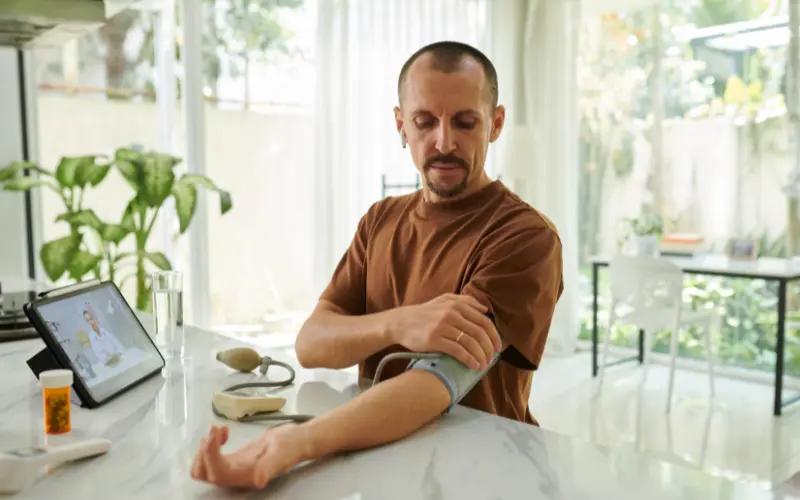
Both conditions damage blood vessels over time, making it easier for fatty deposits to stick and form blockages.
4. Smoking & Alcohol
Smoking reduces oxygen in the blood and accelerates plaque formation. Excessive alcohol disrupts blood pressure and cholesterol balance.
5. Obesity & Inactivity

Being overweight, especially around the belly, increases bad cholesterol and reduces good cholesterol. A sedentary routine compounds the risk.
6. High-Stress Lifestyle
Constant stress increases inflammation in the arteries and can trigger sudden cardiac events even in people with no prior history.
If you fit into any of these categories, your heart might already be under silent stress. The key is catching the signs before they escalate.
Warning Signs: Not All Chest Pain Is Gas

Let’s face it, most people feel chest discomfort and immediately think it’s just gas. Or acidity. Or maybe they “slept wrong.”
That’s exactly how heart blockage hides in plain sight.
So, what makes cardiac pain different?
- It’s not sharp. It’s heavy: Heart-related chest pain often feels like pressure, tightness, or a squeezing sensation like someone’s sitting on your chest.
- It spreads: Unlike muscle pain or gas, cardiac pain can radiate to your left arm, shoulder, jaw, or back.
- It comes with friends: Things like shortness of breath, fatigue, or cold sweat often show up alongside the pain. That’s your body waving red flags.
- It worsens with effort: If your chest pain gets worse when you climb stairs, walk briskly, or even get emotional, it could be your heart struggling to keep up.
- It doesn’t fully go away with rest: Gas pain eases up with antacids or burping. Cardiac pain may feel better for a bit, but it keeps returning. That’s a massive warning sign.
Don’t guess. Act.
If you’re experiencing recurring chest discomfort, even if it feels minor, don’t self-diagnose. You’re not being dramatic. You’re being smart.
Other Symptoms You Shouldn’t Brush Off

Not all heart warnings hit your chest first. Some show up in strange, subtle ways, quiet symptoms most people never associate with heart blockage until it’s too late.
1. Pain in the Jaw, Neck, Shoulder, or Back
Heart nerves are connected across the upper body. Pain radiating to the jawline, left shoulder, or even upper back can signal a blockage, especially in women.
2. Cold Sweat
Breaking into a sudden, unexplained sweat, especially while resting or sleeping, is often a sign that your heart is under stress.
3. Shortness of Breath
If you find yourself winded from routine activities like walking or talking, it could mean your heart isn’t pumping enough blood.
4. Lightheadedness or Dizziness
Low blood flow to the brain due to narrowed arteries can cause sudden dizziness. Don’t chalk it up to weakness or skipped meals without checking deeper.
5. Irregular Heartbeat
A racing, fluttering, or uneven heartbeat, especially when paired with fatigue or unease, needs immediate attention.
6. Unexplained Fatigue
Feeling drained even after a good night’s sleep? That could be your heart working overtime behind the scenes.
These are not “harmless signs.” They’re the body whispering before it screams.
When to Rush to the Hospital

Time is the heart muscle. Every second you delay during a potential heart blockage, your heart loses oxygen, and permanent damage begins.
So how do you know it’s time to stop Googling and start moving?
Drop Everything and Go If You Have:
- Chest pressure, tightness, or heaviness that lasts more than a few minutes
- Pain spreading to your left arm, jaw, or back
- Cold sweat, nausea, or vomiting with discomfort
- Shortness of breath, even when resting
- A racing or irregular heartbeat with fatigue or anxiety
Even if the symptoms come and go, don’t take chances. Many heart attacks start with mild pain or pressure and ramp up slowly.
What to Do Immediately:
- Call emergency services or have someone drive you to the nearest cardiac-equipped hospital (like EDEN Hospital)
- Don’t lie down, stay seated, calm, and still
- Chew one aspirin (300mg) if available and not allergic (it helps thin the blood)
- Loosen tight clothing and focus on breathing slowly
What NOT to Do:
- Don’t wait to “see if it passes”
- Don’t try to sleep it off
- Don’t self-diagnose based on Google or past experience
Heart blockages give you a window, a narrow one. Recognizing when to act can mean the difference between a quick recovery and irreversible damage.
How to Reduce Your Risk Right Now
You don’t need a total life overhaul to start protecting your heart. Small, consistent actions can slash your risk of heart blockage dramatically, even if you’re genetically prone.
Here’s what works:
1. Walk 30 Minutes a Day

Brisk walking improves circulation, lowers blood pressure, and boosts your “good” cholesterol (HDL). No fancy gym needed, just consistency.
2. Clean Up Your Plate
Focus on heart-smart foods:
- Oats, barley, and fiber-rich grains
- Leafy greens, berries, and nuts
- Olive oil instead of refined oils
- Cut back on red meat, fried foods, and excessive salt
3. Quit Smoking (Today, Not Tomorrow)

Within 1 year of quitting, your risk of coronary heart disease drops by 50%. Within 5 years, it nearly matches that of a non-smoker.
4. Prioritize Sleep
Poor sleep raises cortisol, blood pressure, and insulin resistance, all tied to heart issues. Aim for 7–8 hours of quality rest every night.
5. Manage Stress Actively
Deep breathing, yoga, journaling, or even just 10-minute phone-free walks can help. Long-term stress is one of the most underestimated triggers of artery damage.
6. Get Routine Health Checkups

Even if you feel fine, schedule a yearly heart health check, especially after 30. Early detection is your greatest weapon.
Your heart doesn’t fail overnight. It sends quiet warnings. The smarter you are with your habits today, the more powerful your prevention becomes tomorrow.
Why Choose EDEN Hospital?
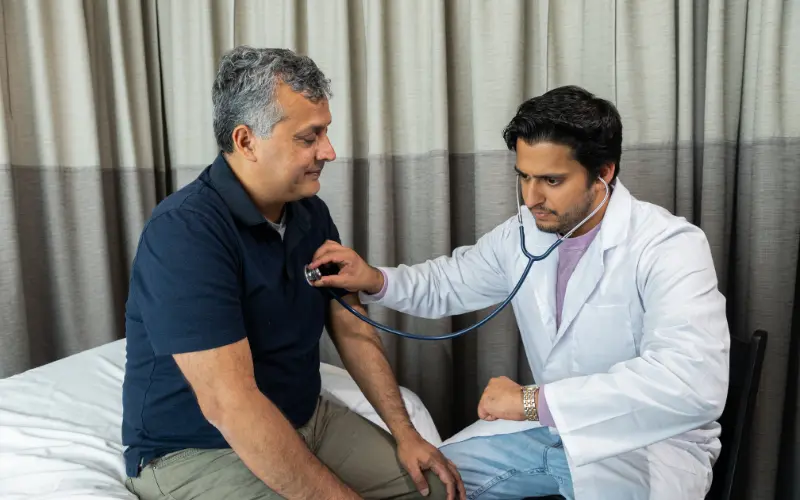
When it comes to heart health, precision and speed can make all the difference. EDEN Hospital is built around both.
Advanced Cardiac Diagnostics
From ECGs to angiography, Eden Hospital is equipped with the latest diagnostic tools to detect blockages before they turn into emergencies.
24/7 Emergency Cardiac Care
Chest pain doesn’t wait for a convenient time, and neither do we. Our dedicated emergency team is available around the clock for immediate cardiac response.
Preventive Heart Screenings
You don’t need symptoms to take control of your heart health. Our screening packages help detect hidden risks early when they’re easiest to treat.
Experienced Cardiologists
Our team includes specialists with decades of experience in diagnosing and treating coronary artery disease. You’re not just getting care, you’re getting expertise that saves lives.
Personalized Consultations
We take the time to explain your results clearly, outline preventive strategies, and answer your questions. No jargon. No rushed appointments. Just clarity and care.
If you’ve experienced any of the symptoms in this article or simply want peace of mind, EDEN Hospital is here to help. Book your heart checkup today.
Frequently Asked Questions:
1. Can a heart blockage clear on its own?
No. While lifestyle changes and medications can slow or stop progression, existing blockages rarely disappear without medical intervention. In severe cases, procedures like angioplasty or bypass surgery may be needed.
2. Is walking enough to prevent heart disease?
Walking daily can significantly reduce your risk, especially when combined with a heart-healthy diet and stress management. But if you already have risk factors, walking alone isn’t enough; you need routine checkups.
3. How do doctors test for artery blockages?
Common tests include ECG, stress tests, echocardiography, CT angiography, and coronary angiograms. The choice depends on your symptoms and risk profile.
4. What’s the difference between a heart attack and a heart blockage?
A blockage restricts blood flow. When that flow is completely stopped, usually due to a blood clot, a heart attack occurs. So a blockage is the setup, the heart attack is the consequence.
5. Are women’s symptoms different from men’s?
Yes. Women often experience more subtle symptoms like jaw pain, fatigue, indigestion, or nausea instead of sharp chest pain. That’s why heart issues in women are often misdiagnosed or missed.
Conclusion:
Heart blockage doesn’t always shout. Sometimes, it whispers through fatigue, pressure, discomfort, or unease. And those whispers? They’re easy to ignore… until they’re not.
The biggest mistake people make is waiting for the pain to feel “serious enough.” But by then, the damage might already be done.
You’ve now seen the early warning signs, the high-risk profiles, and the steps you can take right now to protect your heart. Whether you’re feeling symptoms or just want to be sure, one thing is clear:
Don’t wait for a heart attack to take your heart seriously. Your next move could be the one that saves your life or someone you love.
Schedule your heart health checkup with Eden Hospital today. Because peace of mind beats panic every time.

